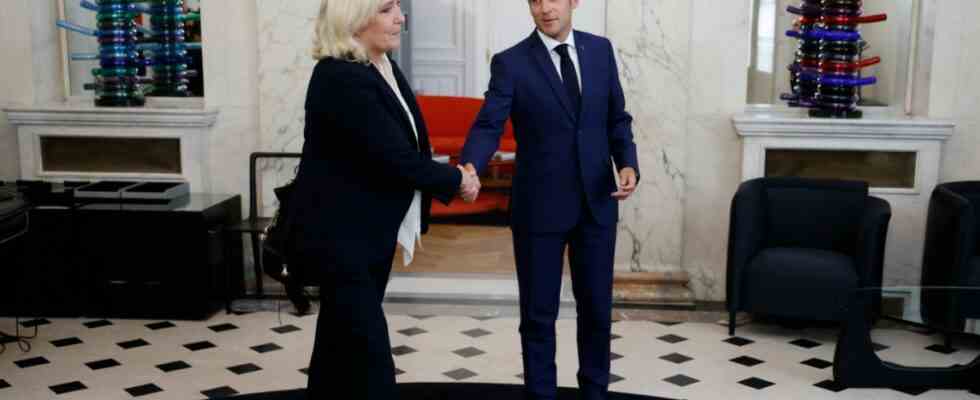After losing his absolute majority in the National Assembly, Emmanuel Macron is trying to adjust to the country’s new political realities. You have to “collectively learn to work and govern differently,” said France’s President in a televised speech on Wednesday evening. It was his first public reaction to his defeat in Sunday’s general election. Macron’s party alliance “Ensemble” won the most seats there, but with 245 MPs it clearly missed the majority of 289 seats that would have been necessary to pass laws without a vote with the opposition.
Macron said voters were “clearly in favor of change.” However, it remained unclear how he intends to shape this change. Unlike in his first term, France’s parliament will now play a noticeably more central role. Macron’s party and its allies lost numerous seats to the left-wing Nupes Alliance (131 newly elected MPs) and the extreme right of Marine Le Pen (89 MPs). That’s why Macron will be dependent on opposition votes in the future to pass laws.
The president said in his speech that it was up to different groups in the National Assembly “to say in the coming days what share of responsibility they wanted to take on”. Whether they are ready “to join a government coalition” – or whether they want to vote on a case-by-case basis from legal text to legal text. However, Macron did not make a specific offer to any party for coalition talks.
In fact, all opposition parties have so far ruled out an official merger with the Macron alliance. The leader of the right-wing Républicains, Christian Jacob, said at the beginning of the week that he was “not called to be German.” In the French context, this means that he will not give up his role as an opposition politician in order to make compromises. “Government participation or whatever of that kind is out of the question,” emphasized Jacob.
The situation is unusual for Macron – and for all of France
The Républicains have 61 deputies in the newly elected National Assembly, which in theory would have been enough to give Macron’s alliance an absolute majority. Even if Jacob ruled out this possibility, he nevertheless announced that he wanted to form a “responsible opposition”. This indicates a willingness on the part of the Républicains to support the government’s individual reform projects.
The current situation is unusual for Macron – and for all of France. This can be seen from the fact that it is completely unclear when a new government will be appointed. In the general election on Sunday, three female ministers failed to win a mandate. They will have to step down, and the Departments of Environment, Health and Maritime Affairs will need new leaders.
Prime Minister Élisabeth Borne also submitted a resignation request, which Macron rejected on Tuesday on the grounds that the government must remain able to act. Another scandal shook the government on Wednesday. Two charges of rape were filed against Secretary of State Chrysoula Zacharopoulou. The allegations relate to her work as a gynaecologist.
But the opposition also got off to a rocky start in the first week of the post-election. On Monday, left-wing ex-presidential candidate Jean-Luc Mélenchon proposed that the left-green alliance Nupes should form a joint faction in the National Assembly. In this way one could prevent the right-wing extremist Rassemblement National as the largest opposition party. Mélenchon’s La France Insoumise party won 72 seats, 55 more than in 2017, but less than the Rassemblement National with its 89 seats. Left-wing forces could only form the largest opposition group if they came together in a more binding manner than in the previous Nupes alliance. This primarily represented an electoral alliance to exclude opposing candidates.
However, Mélenchon had made the proposal for a joint faction in the media without first speaking to his three Nupes partners. These – France’s Greens EELV, the Communist Party and the Socialists – promptly ruled out the option on Monday. But the question of who is the largest opposition faction remains important because it traditionally appoints the head of the Finance Commission. The new parliament will hold its first session next Tuesday.

